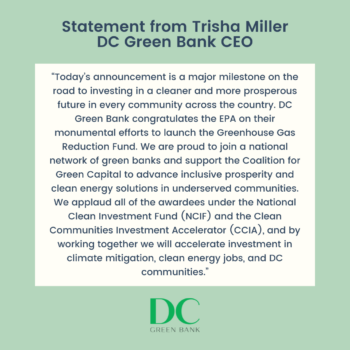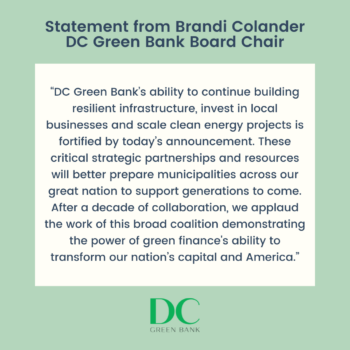The Nicholas Institute for Energy, Environment, and Sustainability at Duke University recently delivered a series of case studies to illustrate past or ongoing projects that have used a variety of financial mechanisms to finance a nature-based solution. Each case study describes the context, the nature-based solution applied, the financial mechanism used, and ideas for how a green bank or community lender could support similar projects.
One of the cases centered on DC’s Stormwater Retention Credit Trading Program, and DC Green Bank’s role is captured as our team seeks to support a more sustainable and resilient future for all Washingtonians.
PROBLEM
Impervious surfaces (e.g., roads, parking lots, and traditional roofs) cover over 40% of Washington, DC, and large rain events generate large amounts of stormwater runoff. High volumes of runoff carry pollutants (e.g., trash, oil and grease, and sediment) into local waterways, degrade aquatic habitats, and contribute to localized flooding.
SOLUTION
In 2013, the DC Department of Energy and Environment (DOEE) enacted the Stormwater Rule, which set a retention standard for stormwater management and established the Stormwater Retention Credit (SRC) trading program. District stormwater management regulations require most new development and major renovation projects to 1) install green infrastructure best management practices that retain stormwater runoff on-site and/or 2) purchase SRCs to meet all or part of their stormwater retention requirements offsite. SRC trading offers increased flexibility for compliance and increases overall stormwater retention by distributing green infrastructure over a larger area, a key factor enabling the Stormwater Rule. The SRC trading program provides regulated projects with flexibility in complying with stormwater management requirements and accelerates the restoration of District waterbodies by incentivizing private investment in green infrastructure construction in high-priority areas. SRC trading allows regulated developers to use SRCs to meet all or part of their stormwater retention requirements off-site. An SRC is a tradable unit, certified by DOEE, equivalent to one gallon of stormwater retention capacity for one year installed voluntarily or in excess of the retention requirement for a regulated site. High-Impact SRCs come from voluntary green infrastructure projects in areas of the District that are most likely to provide the most significant water quality benefits. As the SRC trading market has evolved, DOEE has adjusted SRC trading rules to maximize private investment in high-impact voluntary green infrastructure. The SRC market is now well-established, with several hundred SRC trades and growing SRC demand each year, and DOEE plans to refine SRC trading rules to require the use of High-Impact SRCs in most cases. This will help accelerate the restoration of District waterbodies by increasing demand for SRCs from voluntary projects built in regions of the District that are most likely to provide significant water quality benefits. In 2016, DOEE established the SRC Price Lock Program to “jump start” the SRC market supply and ensure that there would be an affordable supply of High-Impact SRCs. The SRC Price Lock program derisks investment in voluntary green infrastructure by offering purchase agreements that give SRC Aggregators (businesses that generate and sell SRCs) the option to sell SRCs on the SRC market or to DOEE at fixed guaranteed prices for 12 years. Participating SRC Aggregators retain the option to sell credits on the market and receive subsidy payments for market sales, helping to maintain competitive SRC prices.
Click here to read the full case study or view below.
dc-stormwater-retention-credit-trading-program_0

